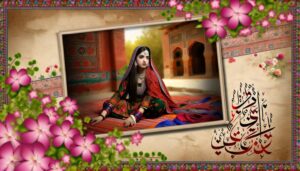Manahal Name Meaning in Urdu
The name Manahal, deeply rooted in Arabic heritage, means 'spring of fresh water' or 'fountain' in Urdu. This name carries cultural significance, symbolizing purity, life, and sustenance.
It's often chosen for girls, reflecting cherished values and traditions found within Islamic culture. With its profound meaning and appealing sound, Manahal enjoys increasing popularity in Urdu-speaking regions.
Its connection to notable personalities like journalist Manahal Tariq and poet Manahal Babar highlights its cultural resonance. To discover more about the cultural and historical layers of this name, simply explore further.

Key Takeaways
- Manahal means 'spring' or 'fountain' in Urdu, symbolizing purity and life.
- The name originates from the Arabic word 'مناهل' (Manahil), meaning a source of fresh water.
- It holds cultural and spiritual significance in Islamic tradition, reflecting sustenance and vitality.
- Commonly given to girls, it represents cherished values and heritage in Urdu-speaking communities.
- The name's popularity is enhanced by its beautiful meaning and cultural resonance in Urdu literature and media.
Origin of the Name Manahal
The name Manahal originates from the Arabic language, where it carries profound cultural and historical significance. When you explore the origins of this name, you uncover its rich ties to Arabic-speaking cultures and its deep-rooted presence in historical contexts.
Manahal isn't just a name; it's a reflection of a heritage that spans centuries. The cultural significance of Manahal is often linked to attributes valued in Arabic traditions, such as generosity and kindness.
Understanding the origin of Manahal helps you appreciate not just its linguistic beauty, but also its cultural depth. This name has been passed down through generations, carrying with it the essence of a shared history and collective memory that's both meaningful and inspiring.
Linguistic Breakdown
Examining the linguistic structure of the name Manahal reveals its intricate composition and the layers of meaning embedded within its Arabic roots.
The name derives from 'مناهل' (Manahil), which is the plural form of 'منهل' (Manhal), meaning 'spring' or 'fountain'. This etymology underscores a sense of abundance, nourishment, and life.
Key linguistic elements include:
- Root word 'ن هـ ل' (n-h-l): Associated with drinking or quenching thirst.
- Plural form: Reflects richness and multiplicity.
- Phonetics: The name's lyrical quality contributes to its appeal.
- Semantic fields: Encompasses themes of water, sustenance, and life force.
Understanding these nuances helps you appreciate the depth and beauty embodied in the name Manahal, making it not just a name, but a symbol of life-giving essence.
Cultural Significance
Throughout history, the name Manahal has carried profound cultural significance, resonating deeply within Arabic-speaking communities.
You'll find that Manahal, derived from Arabic roots, symbolizes a 'spring of fresh water' or 'fountain,' embodying purity, life, and sustenance.
This name is often bestowed upon girls with the hope that they'll bring peace, prosperity, and refreshment to those around them.
In Islamic tradition, water holds immense spiritual value, representing life and divine mercy.
Naming a child Manahal is an expression of cherished cultural and religious values, showcasing its role in shaping identities and fostering connections within the community through the recognition of its rich cultural context.
Popularity in Urdu-Speaking Regions
How prevalent is the name Manahal among Urdu-speaking communities, and what factors contribute to its popularity?
Manahal is increasingly favored in Urdu-speaking regions due to its beautiful meaning and cultural resonance.
You'll find that several factors drive its widespread use:
- Cultural heritage: The name's roots in Arabic and its significance in Islamic tradition enhance its appeal.
- Meaning: Manahal, meaning 'spring of fresh water,' symbolizes purity and life, compelling many parents to choose it.
- Media influence: Popularity of the name in literature, television, and social media further boosts its visibility.
- Modern trends: A growing preference for unique yet culturally rooted names makes Manahal a popular choice.
Understanding these elements helps you appreciate the name's significance and widespread usage.
Famous Personalities Named Manahal
Consequently, several accomplished individuals named Manahal have made notable contributions across various fields, reflecting the name's esteemed cultural heritage.
You'll find Manahal Tariq, a distinguished journalist known for her incisive reporting in Pakistan. Her work has shed light on critical socio-political issues, earning her widespread acclaim.
Another notable figure is Manahal Babar, an emerging poet whose evocative verses have captivated literary circles. Her poetry explores identity, culture, and personal experiences, adding a fresh voice to contemporary literature.
In the domain of academia, Dr. Manahal Khan, a renowned researcher, has published extensively on environmental science, contributing valuable insights to the field.
These individuals exemplify the impact and cultural significance associated with the name Manahal.
Conclusion
In exploring the name Manahal, you’ve journeyed through its origins, linguistic nuances, and cultural significance in Urdu-speaking regions. As you unravel more about the name Manahal, you also uncover its connections to traditional Urdu literature and poetry, where it holds a special place. Additionally, the eshal name meaning in Urdu adds another layer of understanding to the significance of names in this rich and diverse culture. Overall, the exploration of the name Manahal has provided a deep insight into the complexities and beauty of Urdu language and its cultural heritage.
Like a vibrant tapestry, each thread of information we've uncovered enriches our understanding.
By appreciating its popularity and recognizing notable individuals who bear this name, you connect more deeply with its heritage.
This knowledge not only celebrates the name's beauty but also honors the cultural tapestry from which it emerges, fostering a greater appreciation for Urdu traditions.






